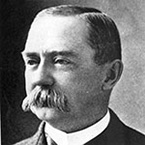
John Collins Warren, II, was the scion of a dynasty of Boston surgeons, known as the Warrens of Harvard Medical School because of the indelible mark their research, writing, teaching, and medical and surgical labors had on the school’s development. His great grandfather, John Warren, laid the foundations for the Harvard Medical School curriculum, and his grandfather, John C. Warren I (1778-1856), one of the most renowned American surgeons of the 19th century, demonstrated the first public use of surgical anesthesia, “sulphuric” ether in 1864, was the first dean of Harvard Medical School, and was a founding member of the Massachusetts General Hospital. J. Mason Warren (1811-1867), Dr. Warren II’s father, performed the first rhinoplasty in the United States in 1836.
He was educated at Harvard University (AB, 1863) and Harvard Medical School (MD, 1866). He continued his medical studies in Vienna, Berlin, Paris, and London, after which he opened a private practice in Boston. In 1899, he was named the first Moseley professor of surgery at Harvard. His expertise was the surgical treatment of tumors, especially breast tumors. He developed a special knife for the dissection of breast tumors, produced by Codman and Shurtleff, famous makers of surgical tools. He was chairman of the Cancer Commission of Harvard University and raised funds for the Collis P. Huntingdon Memorial Hospital for Cancer Research. He was the driving force behind the construction of the buildings of the Harvard Medical School quadrangle and adjacent Longwood Medical and Academic Area buildings and made the opening speech at their dedication in 1906. The building that houses a large part of the current pathology department is named the Warren Building after Dr. J. Collins Warren II, and his remarkable family.
Dr. Warren was a strong believer in educating doctors and sharing experiences with his colleagues. While on the staff of Massachusetts General Hospital from 1869 to 1905, he became one of the foremost proponents of Joseph Lister’s antiseptic procedures during surgical operations. He published frequently, including several classic articles on his surgical techniques and results. He was the co-editor of the Boston Medical and Surgical Journal (now the New England Journal of Medicine) from 1873 to 1881 and president of the American Surgical Association (1896-1897).